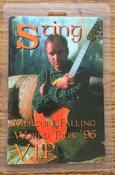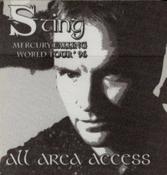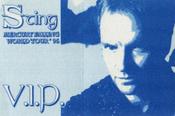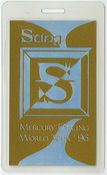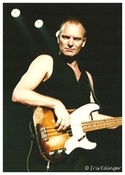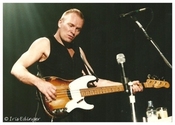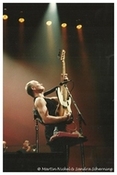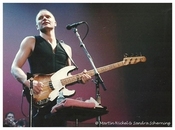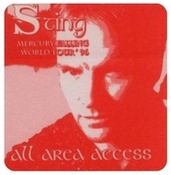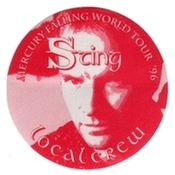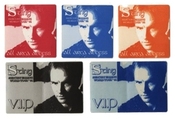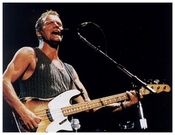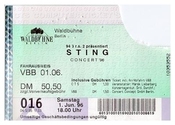
The soft mosquito tamer - Sting and his band thrilled the Waldbühne audience with their smoochy songs...
Sting even had the swarms of mosquitoes under control: The insect ballet fluttered through the cloudy evening sky to the jazzy sounds of saxophone (Butch Thomas) and trombone (Clark Gayton). After all, the name of the former "Police" singer doesn't mean "sting" for nothing.
But even more than the mosquitoes, the audience was thrilled by the "Englishman in Waldbühne" and his outstanding band.
The former rocker and now smoochy balladist played 105 minutes for "meine Berliner" (my Berliners). He mostly stood still behind the microphone, squirming a little at most.
Of course, no one expected wild rocking during the songs from his soft solo albums. But during the hits from his "Police" days, Sting's bass booms in 22,000 bellies, and he roars across the stage with the horns. During "Roxanne" and "Every Little Thing She Does Is Magic," everyone sings, even the people on the benches rise, and the lawn is already dancing.
Around 9:30 p.m., the audience unpacks their magic candles and Sting unpacks his bass. Much too early! Twice, the fans cheer him back on stage, and then it's finally over.
The fans make their way home, humming quietly, and the mosquitoes wake up again.
(c) Berliner Zeitung (thanks to Valeria Vanella)
A professional who enjoys experimenting - Celebrated Sting concert at the sold-out Waldbühne...
Gordon Summer has nothing left to prove. As Sting, the singer and bassist fills the biggest arenas, boasts countless hits, and has an audience that practically eats out of his hand. Of course, that also applies to Berlin, where he recently performed at the Waldbühne, which has been sold out for weeks.
With his first band, The Police, whose musical mastermind was the former elementary school teacher, he achieved cult status with five albums in just five years and hits like 'So Lonely,' 'Message In A Bottle,' and 'Can't Stand Losing You.' In 1983, Sting disbanded The Police and continued on his own. A step that led him further up the ladder of success, although Sting continually strives to forge new paths. Sting's path is not to grow old complacently in the pop business.
The evening will be opened by Paul Carrack, originally the singer of Mike & The Mechanics. This year, he released a solo album, 'Blue Views,' on which he dedicated himself to melodic radio pop. Danceable rhythms and striking keyboard sounds underscore his distinctive voice. Whether it's the hit single 'Over My Shoulder' or the new 'Oh Oh Oh My My My,' Paul Carrack has an easy time at the Waldbühne and is bid farewell to a hearty round of applause after just under an hour.
However, Carrack, who hails from Sheffield, can't quite match the enthusiasm that Sting triggers just by appearing. Instead of opening his set with old hits, Sting plays four tracks from his new album 'Mercury Falling' right at the beginning. He focuses entirely on the music, avoiding gimmicky interludes. The light show subtly forms a pleasant backdrop.
The focus, however, is Sting's vocals, with which he imparts an unmistakable stamp to the individual songs. This way, the songs don't lose their identity even with significant variations. 'If You Love Somebody Set Them Free' is introduced by a longer instrumental passage, 'Demolition Man' features dissonances, and over the course of the evening, the musicians in his band are given the opportunity to shine with short solo interludes. The horn duo of Butch Thomas and Clark Gayton, whose saxophone, clarinet, and trombone influence the music far more than is the case on record, is striking.
For Sting, his time with The Police is over, and he gives them little space now. 'Roxanne' and 'Synchronicity' in particular are enthusiastically acclaimed. But Sting relies on a spirit of experimentation on stage, skilfully creating very different moods and even leaving out big hits like 'Russians'.
Sting's program is not routine, but professional and yet spontaneous. He sings 'Lithium Sunset' together with Paul Carrack, and 'Englishman In New York' is spiced up with a rap interlude. And of course, Sting easily wins over his audience, who cheer him loudly after two hours and four encores.
(c) Berliner Morgenpost by Lothar Landt (thanks to Valeria Vanella)
There's never been so much lightness...
There's never been so much lightness - Sting and his fans: a beautiful evening at the Waldbühne - From "Roxanne" to "Demolition Man": Sting and his Berliners at the Waldbühne - a truly beautiful evening
Plug in, make it loud, and go, that's how it used to be, raves the rock 'n' roll legend. Today, unfathomable procedures called soundchecks stall. There's a lot of care, more art. And stage sets: this one has slanted gray panels, a gray landscape on a gray cloth. In other words, the stage this evening belongs to an unpretentious person and solid music: Sting in the sold-out Waldbühne.
Demonstrative modesty is also a virtue. There's hardly any artificial smoke, and the spotlights don't paint any of those garish colours; at most, the show shimmers bluish, greenish, and reddish. Just once, the red pops out. "Roxanne," you put on the red light. That's the program. Projections of lewdness, latex, and leather now grace the panels. It was Gordon "Sting" Sumner's first massive hit and is still the pinnacle of his guest appearances. All the more so because "Roxanne" doesn't degenerate into an intimate unplugged interlude like it did recently. It grows into reggae with lots of bass and trombone. So far, so groovy. This Sting no longer has anything pastoral about it. Instead, there's a guy jumping around saying "Hello, my Berliners," in a leather suit for fire chairs.
Just you and me. But a star is a star is a star. And only he can fill half a concert with songs from his brand new album without them yawning off the stage. They're even singing along to this gospel song "Let Your Soul Be Your Pilot." Or "I Was Brought To My Senses," a Celtic ballad. which suddenly turns into soul pop.
The new songs are more frivolous, full of repressed little stylistic breaks and tiny metrical subtleties. It doesn't matter - "Everything clear?" he calls, and follows up with an old hit as a reward. 'If You Love Somebody Set Them Free' in a slight variation from 1986.
There has never been such lightness when Sting appeared before humanity. He had embarrassingly made everything private public. That his father was a simple milkman and his mother a hairdresser, his trained teaching profession, his large family, the English country house, yoga, football passion, sudden hearing loss.
And he had loudly declared the public matters to be personal: ecological concerns, the rainforest, apartheid, resistance in Chile, and hardship in the mining industry. He may have sensed that stars aren't expected to throw themselves into major debates simply by virtue of their popularity. Sting practiced humour against justified criticism: just entertainment in self-defence.
But irony never works, and only today does everything sound so simple. Even 'Mad About You', from the 'Soul Cages', with which he intended to process the death of his parents, becomes a relaxed number here, with a friendly, husky falsetto, soprano sax, and lively brass. The band in general: little jazzy interludes repeatedly lighten the music, sometimes even longer ones.
Kenny Kirkland tears apart the old 'Bring On The Night' with a sprawling piano solo. Vinnie Colaiuta, the madman behind Frank Zappa back then, gyrates on the drums, Dominic Miller plays guitar, Butch Thomas and Clark Gayton play saxophone and trombone.
And Sting actually keeps their skills together with the bass. 'Synchronicity' has energy again – a Police rip-off, with nervous drums and breathless guitar, the most beautiful thing since the original. All that yeaheaheahoh and hejohejohejojo. This time, there's no coquettish head-heavyness, no Weill, Stravinsky, or Prokofiev. Instead, there's 'Demolition Man,' the music for the film. Sting has made a lot of music for the cinema, often appeared in front of the camera himself, and would so love to be considered what pop music has long since reverently called a "total work of art." Almost at the end, as an encore, that persistent 'Every Breath You Take.' Does it have to be played again and again? It must. Says the Waldbühne, lighting its sparklers. It's not an experimental stage for testing material and audiences. Here, the rule is: the star gets his cheers, the people something familiar. And so the evening is as beautiful as ever, when the semicircle is colourful to the brim. The sky has held its water.
At the end, the stands empty, a polite zipper system. That, too, so it is said, was once different.
(c) Der Tagesspiegel by Michael Pilz (thanks to Valeria Vanella)

